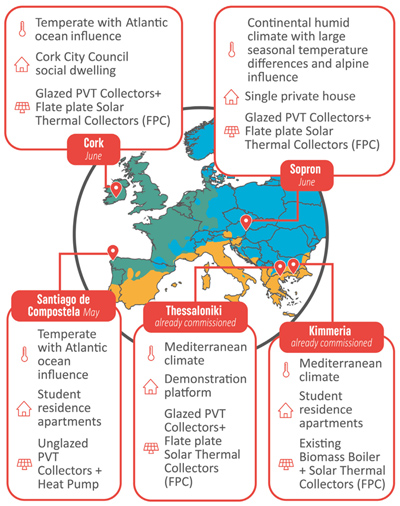Flexible, high-capacity heating and cooling technologies are ready to leverage the variability of renewable energy in the residential sector
MiniStor, a Horizon 2020 project, is testing its high-density thermal storage system in multiple climate conditions and home configurations, providing both heating and cooling in an integrated yet flexible unit. The consortium, gathering seventeen partners from the EU and Switzerland, and coordinated by IERC, has reached its final phase with the deployment of units across 5 demonstration sites.
 Operating year round, MiniStor aims to provide energy security across Europe's residential sector with a thermal storage density well over 10 times that of water, a practical solution for leveraging the variability of renewable energy sources.
Operating year round, MiniStor aims to provide energy security across Europe's residential sector with a thermal storage density well over 10 times that of water, a practical solution for leveraging the variability of renewable energy sources.
Concept
At its core, the system combines an efficient thermochemical storage and a phase-change material that stores latent heat. When paired, the multiday energy storage reactor based on CaCl2/NH3 salts along with the PCM storages for cooling and heating reach a high density of 213 kWh/m3, allowing a minimal size installation and scalability.
This state-of-theart thermal storage setting initially envisioned by CERTH/CPERI and CNRS-PROMES and manufactured by Sofrigam lies alongside the control room unit within a container, measuring 3.5m long, 2.5m width and 2.7m height, and around two and a half tonnes.
At a suitable distance from the MiniStor container there are also unique solar hybrid photovoltaic thermal (PVT) collectors, which not only reach the required heat for activating the reactor, but also generate electricity for a battery system. ENDEF's newly design PVT panels include glazed collectors, with a laminate of 265Wp, to be combined with solar thermal flat plate collectors (FPC); and unglazed collectors, with a laminate of 390Wp.
Critically, the entire operation is handled via the Home Energy Management System (HEMS), a smart digital tool devised by CARTIF. Key to the technology fusion, it is now being developed into a second iteration to actively consider demand and generation predictions to help in comfort control and long-term decision-making.
Alongside an Internet of Things (IoT) platform build by CERTH/ITI, it will help in the user-centric approach and allow obtaining feedback from users. In conjunction, the MiniStor system leverages the variability of renewable energy sources, saving thermal and electrical energy until they are in short supply.

Demonstration
One of the prototypes was at a test environment from April to May, under evaluation for summer and winter operation modes at the ÉMI facilities. The analysis of said evaluations is nearly finished, but it already served SGS in the preparation of MiniStor’s own Project Audit Program, covering the manufacturing process in Psyctotherm as well.
The main evaluations build on the Thesaloniki pre-pilot at CERTH premises, where MiniStor was first installed in December 2023. During the preliminary tests, commissioning and optimisation of the system control, performance and safety measures were accounted for and evaluated through certification of the TCM reactor and the enclosure by notified bodies in France and Greece.
In the last months, additional tests were performed in the SmartHome development platform of CERTH/ITI, including the Supervisory Control and Data Acquisition (SCADA) systems, controllers and hydraulics, start-up, charging and discharging stepwise process, and the PLC software upgrade. Although the pre-pilot at CERTH has verified that MiniStor operates smoothly and safely, further performance monitoring and assessment will follow during the next twelve months.
While the rest of the units were being assembled, shipped and commissioned, the DUTH demonstrator in Kimmeria was the second to receive the MiniStor unit. This site is slightly different from the rest, as the Ministor container will receive its energy from an existing solar field and biomass boilers, proving the complementarity of the system with different configurations and energy sources that have been servicing these dormitory buildings in recent years.
MiniStor is calling for the standardisation of its technologies, working for a value chain beyond industrial parameters, and supporting adequate certifications for maintenance, comfort and performance. Its relevance has only increased in recent years, for controllable and high-capacity thermal storage can increase the use of renewable energy based sources for the heating and cooling of homes across the European Union, moving it closer to the decarbonisation goals. Moreover, this practical solution is poised to be scaled up for various configurations due to its high density and design modularity.